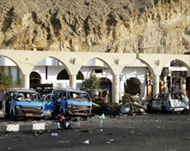Sinai blast site may host Arab meet
An Arab summit expected in August could take place in the Egyptian Red Sea resort of Sharm al-Shaikh, where bombs killed at least 64 people last week, Arab League chief Amr Moussa has said.

Speaking on Wednesday at Cairo airport on his return from New York, Moussa told reporters that Sharm al-Shaikh was a candidate venue for the summit, which league officials say will be in Egypt.
But Arab League spokesman Hossam Zaki said later that the venue was up to member states, if and when they agree to a summit. Moussa did not say where it would be, he added.
A former assistant to the Egyptian minister of interior said the Sharm al-Shaikh bombings targeted the resort’s political role.
“The occurrence of such events despite the tight security measures, and the fact that the president is there most of the time might have direct relation with Sharm al-Shaikh’s political and strategic role,” Abdullah Al Ashaal told Aljazeera.net.
An Egyptian political expert concurred that the attacks aimed to undermine the resort’s reputation for security. “Sharm used to be a symbol of security, since all conferences are held there. … It is the city of the president,” said Diaa Rashwan, of the Al Ahram Centre for Political and Strategic Studies, referring to the president’s frequent visits.
DNA tests
Egyptian police have taken DNA samples from four Sinai families as they search for the Sharm al-Shaikh bombers, security sources said on Wednesday.
Police are trying to match the DNA from the families with the DNA from remains found at the bomb site, on the assumption that some of the bombers were killed.
But Public Prosecutor Maher Abdel Wahed told a news conference that it would take time to have results.
“We have not got to the perpetrators or identified them yet,” he aid.
 |
|
The Sharm al-Shaikh attacks were |
The families live in or around the north Sinai town of al-Arish, reflecting the investigation’s focus on a possible link between the Sharm al-Shaikh bombings and similar attacks on resorts frequented by Israelis in October.
The group that bombed the Taba Hilton and two other resorts in October was based in al-Arish, a small town on the Mediterranean coast with a population of settled Bedouin, immigrants from the Nile Valley and Palestinian refugees.
The security sources named the four men whose families gave DNA samples as Moussa Badran, Ihab Mohamed Rabia, Osama
al-Nakhlawi and Khaled Musaid, all of Bedouin origin.
Police have DNA from another prime suspect, Mohamed Fulayfel, the brother of one of two bombers who died by mistake at the Taba Hilton.
Fulayfel is on trial in absentia for his role in the October bombings.
|
“Revenge may be the main motive for the Sharm al-Shaikh bombings”. Al-Masry al-Yom newspaper, Egypt |
Prosecutor Abd al-Wahed said the toll was 64, of which
47 have been identified, including 10 foreigners – five Italians, three Turks, an American and a Czech.
The British authorities say at least one Briton died and others are missing.
Hospital sources say the blasts killed 88 people, but many bodies were blown apart.
Harsh treatment
Egyptian commentators say the authorities may have unwittingly contributed to the Sharm al-Shaikh bombings with their harsh treatment of al-Arish people after the Taba attacks.
Human rights organisations say the police arrested 2500 young men from the town last year, held many of them for months without charges and tortured some. Security sources said on Wednesday that 139 of them are still in jail.
The government has said that the number of detainees was exaggerated and that it investigates any accusation of torture.
“Revenge may be the main motive for the Sharm al-Shaikh bombings,” the independent newspaper al-Masry al-Yom said on Wednesday, quoting sociologists and psychologists.
“There is a possibility that the arrests (in al-Arish) had a role,” said lawyer Muntasser el-Zayyat.
“I believe the main target of those who carried out the operation is to strike blows at Westerners, but alongside that another aim may have arisen after the violations against those detained or suspected in the Taba explosions,” he said.
Others have said motives for the Sharm al-Shaikh attacks remain unclear.
Ahmad Thabet, an Egyptian professor of political science, told Aljazeera.net: “There are people who think that these events are connected in one way or another to recent ones in London. … There are those who say that these events came as a revenge to what happened to the families in Sinai after the Taba bombing, but … nothing is clear yet.”
In parallel with the forensic work, security forces have been searching the valleys and rugged mountains of south Sinai for Bedouin who may have helped in the bombings.
Police and Bedouin exchanged fire in the mountains earlier this week but there were no casualties.
Doha Al-Zohairy in Cairo contributed to this report.